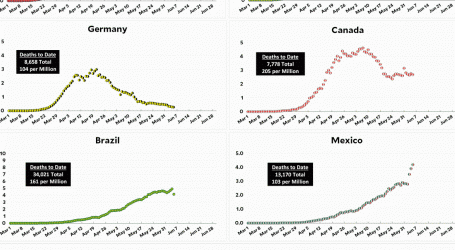Betsy DeVos Has Scrapped More Than 1,200 Civil Rights Probes Started By the Obama Administration
Tom Williams/Congressional Quarterly/Newscom/ZUMA Press
Looking for news you can trust?Subscribe to our free newsletters.
This story was originally published by ProPublica.
Whether schoolchildren in DeSoto County, Mississippi, are paddled varies by their race. Black students are almost two and a half times more likely than whites to endure the corporal punishment permitted under school district policy for skipping class, insubordination, repeated tardiness, flagrant dress code violations, or other misbehavior: up to three “licks per incident on the buttocks with an appropriate instrument approved by the principal.”
Black students in DeSoto—a suburban area just south of Memphis, Tennessee—are also more prone to face other forms of school discipline. While comprising 35 percent of district enrollment, they account for 55 percent of suspensions and expulsions, and more than 60 percent of referrals to law enforcement, federal education data shows.
Citing such disparities, a group of families in the county filed a federal complaint in 2015 with the help of the Advancement Project, a national advocacy group. For three years, the US Department of Education’s Office for Civil Rights investigated DeSoto, visiting schools and meeting with parents and administrators, according to the complainants. Then, this past April, the department closed the probe without finding any violation, due to “insufficient evidence.”
“This is indicative of how they are now evaluating and handling complaints,” said Kaitlin Banner, a senior attorney with the Advancement Project.
A ProPublica analysis of data on more than 40,000 civil rights cases, obtained through multiple public records requests, bears out Banner’s point. We found that, under Secretary of Education Betsy DeVos, the department has scuttled more than 1,200 civil rights investigations that were begun under the Obama administration and lasted at least six months. These cases, which investigated complaints of civil rights violations ranging from discriminatory discipline to sexual violence in school districts and colleges around the country, were closed without any findings of wrongdoing or corrective action, often due to insufficient evidence.
Elizabeth Hill, a spokeswoman for the Department of Education, didn’t dispute ProPublica‘s data. She maintained that the Office for Civil Rights is “as committed as ever” to vigorous civil rights enforcement.
“Where the evidence is insufficient for OCR to prove a violation of law, or the facts show that dismissal is appropriate on other grounds, OCR closes the case, which provides much-needed closure for both students and institutions,” she said in an emailed response, adding that the Trump administration has “restored the role of OCR investigators as neutral fact-finders.”
ProPublica also found that the Office for Civil Rights has become more lenient. Under Obama, 51 percent of cases that took more than 180 days culminated in findings of civil rights violations, or corrective changes. Under the Trump administration, that rate has dropped to 35 percent. (We compared the first 15 months of resolved cases under Trump with the preceding 15 months under Obama, and limited our analysis to cases that took at least 180 days in an attempt to weed out those that were open-and-shut, duplicative, or didn’t require a full probe.)
Outcomes on specific topics reflect this pattern. For instance, 70 percent of complaints of discrimination against students with limited proficiency in the English language were upheld under Obama, compared to 52 percent under the current administration. The proportion of complaints substantiated regarding the individualized educational needs of students with disabilities has dropped from 45 percent to 34 percent; regarding sexual harassment and violence, from 41 percent to 31 percent; and regarding racial harassment, from 31 percent to 21 percent.
These differences reflect the contrasting approaches of the Obama and Trump administrations to civil rights enforcement, according to people familiar with both. Under Obama, the Office for Civil Rights looked into instances of discrimination against individuals, but also made it a priority to carry out more time-consuming and systemic investigations into disparate treatment of students based on race, disability, or other factors.
“If all you see when you get a complaint is one kid and one dispute with a school, you will be able to resolve that—and maybe even in the kid’s favor—pretty quickly, but you are focusing on the needles and not the haystacks.”On the other hand, efficiency is the Trump administration’s priority. It has restricted the time and scope of investigations, concentrating on individual complaints that can be handled quickly, and seeking to clear a backlog of more expansive cases. As a result, it has resolved about 3,250 cases that lasted more than six months, compared to about 1,150 during the last 15 months of the Obama administration. Because of this high volume, the raw number of cases concluded with findings of wrongdoing has increased under DeVos, although the percentage is considerably lower.
“The extraordinary backlog of cases inherited by this Administration was greatly concerning to OCR,” said Hill. “Processing the stalled cases has been a priority, as has trying to meet our agency goal of processing new cases within 180 days.”
The data documents the Trump administration’s tilt away from systemic issues to complaints by individual students, said Seth Galanter, a former senior official in the Education Department’s civil rights office under Obama. “If all you see when you get a complaint is one kid and one dispute with a school, you will be able to resolve that—and maybe even in the kid’s favor—pretty quickly, but you are focusing on the needles and not the haystacks,” he said. “The way they are approaching it is they are only dealing with the squeaky wheel. They aren’t doing their full job, which means they can move quickly.”
Hill said such criticism was “unfounded. Under the current Administration, OCR decides whether to conduct systemic investigations based on the facts of a case, not the ideological biases of OCR’s political appointees as did the prior Administration,” she said. “OCR recognizes that many schools and colleges want to rectify civil rights problems and the end result will be greater equity for more students when OCR is willing to work with schools rather than against them.”
While the 12 regional bureaus under Obama often needed approval from headquarters to settle or dismiss a case, DeVos is resolving probes faster by decentralizing decision-making and giving the regions more latitude to decide outcomes, Hill said. Perhaps reflecting this policy, the proportion of investigations that found violations or required corrective action has ranged under DeVos from more than half for the New York office to about a quarter for the Philadelphia office. Hill said that OCR’s “legal standards are consistent nationally” and these variances reflect the different mix of cases that each office handles.
For our analysis, cases resolved through a settlement, mediation, or other involvement from OCR were counted as having corrective changes or findings of violations. If a single complaint contained multiple allegations, and one or more of the claims was substantiated, we marked the entire case docket as finding violations or resulting in corrective change. Because of gaps in the information provided to ProPublica, about 1.5 percent of OCR cases resolved under the Trump administration—most of them in a two-week period in December 2017—are not reflected in our analysis.
Under federal law, including the Civil Rights Act of 1964, the Office for Civil Rights is responsible for ensuring equal access to education and investigating allegations of discrimination in the country’s schools and colleges. Families and students can file complaints with the office, which then investigates and determines whether a college or school district may have violated federal law. If violations are substantiated, the office typically negotiates a settlement or prescribes corrective changes, which it sometimes oversees. For some complaints, the office may mediate a resolution. It receives more than 10,000 complaints annually, and has a target of resolving 80 percent of them within six months.
As the Obama administration tackled more complicated investigations, the cases took longer to resolve. From 2010 to 2015, time spent on the average sexual violence investigation increased from 289 to 963 days; on a school discipline case, from 198 to 451 days; and on a harassment probe, from 200 to 287 days. At the department’s request, Congress boosted the office’s budget.
DeVos is rolling back this expansion. In an internal memo last June, Candice Jackson, then the head of the civil rights office, urged investigators to stop looking at complaints through a systemic lens, and dropped the requirement that all discipline and sexual violence investigations had to review three years of district or college data. A case processing manual released this past March broadened the circumstances that allow investigators to close a probe or dismiss a complaint—for example, if it is part of a serial filing (repeated complaints by one person or group about the same situation) or poses an “unreasonable” burden. DeVos also barred complainants from appealing the office’s decisions. The department intends to shrink OCR’s staff from 569 to 529, including nearly two dozen attorneys and equal opportunity specialists, according to its annual budget proposal.
Under DeVos, the department has scaled back a proactive type of civil rights investigation known as a compliance review. These reviews may stem from statistics, news reports or other sources, as well as from complaints by parents or students. They often explore systemic issues such as racial disparities. During the last 15 months of the Obama administration, OCR opened 13 compliance reviews, probing a variety of areas from access to rigorous curriculum to services for students with limited English proficiency. In its first 15 months, the Trump administration initiated only two compliance reviews, looking at education for students with disabilities in a juvenile correctional facility in Arizona, and use of isolation and restraints in an alternative education program based in Virginia. OCR may conduct more compliance reviews in the coming months, Hill said.
Since DeVos took over the education department, she has been under fire for her approach to civil rights. Earlier this month, the National Association for the Advancement of Colored People, alongside disability advocates, filed a lawsuit against the education department, alleging that its procedural changes are leading civil rights investigators to unlawfully dismiss complaints without a full investigation. Hill declined comment on the pending litigation.
The drop-off in the rate of finding violations could mean that OCR’s investigations are becoming less rigorous, said Catherine Lhamon, the former head of the civil rights office under Obama. “We want speedy justice, but you still have to thoroughly investigate each complaint.”
One long investigation terminated by the Trump administration took place in Bryan, Texas.
“I read the [parents’] claims and I just felt like we were fair in our disciplinary decisions.”As ProPublica previously reported, the Dallas bureau of the federal civil rights office spent more than four years investigating whether disciplinary practices in Bryan discriminated against students of color. Federal investigators found at least 10 incidents where black students received harsher punishment than their white peers for the same conduct.
Weeks before Trump’s inauguration, federal investigators and the district were on the cusp of a settlement that would have required more than a dozen reforms. But after DeVos took over, the case and the pending settlement were scuttled, with no findings of wrongdoing.
In late April, OCR also shelved the investigation into school discipline in DeSoto County, where 852 students—more than half of them black—received corporal punishment in 2015.
Shelia Riley, the chairperson of DeSoto’s school board, told ProPublica that OCR’s decision was appropriate. “I read the [parents’] claims and I just felt like we were fair in our disciplinary decisions,” she said. She added that she supports corporal punishment for misbehaving students.
Renee Wade, a registered nurse in DeSoto County, told ProPublica that her son, who is about to enter ninth grade, has received corporal punishment more than 10 times over the past seven years for conduct such as acting out in class. These behaviors are associated with his attention deficit hyperactivity disorder, for which he has an individualized education program that doesn’t include physical beatings.
Even though Wade could exempt her son from being paddled under district policy, the alternative is typically suspension, which she felt wasn’t a practical option. Wade and her husband have full-time jobs and can’t care for their son if he’s home during the working day. “If the school can’t use corporal punishment, then they get suspended,” said Wade, who is African American. “If you work, then this is not a possibility. I feel as a parent I have no other choice.”





